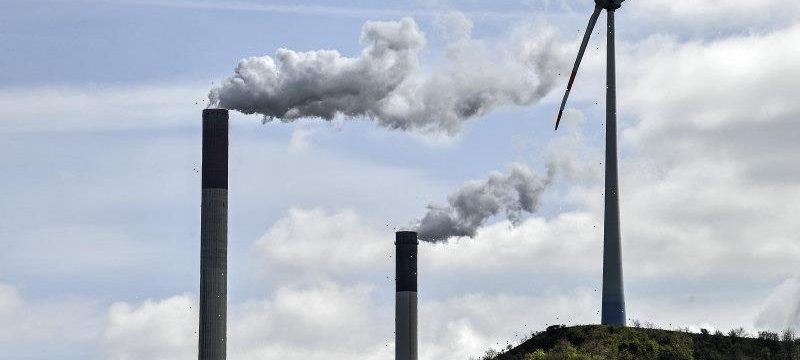The number of coal plants in early stages of development around the world has collapsed by 76 per cent since the Paris Agreement was signed with 41 countries committing not to build any new coal power stations.
Chimneys of a coal-fired power plant smoke beside a wind turbine in Gelsenkirchen, Germany.Credit:AP
Since 2015, 1175GW of planned coal-fired power projects have been cancelled, avoiding a 56 per cent increase in coal capacity, according to a study of what is known as the global coal pipeline, which includes coal power stations in pre-planning and financing stages through to the start of construction.
In that time, cancelled plants exceed newly operational by a factor of 3.6 to 1, according to the study of the sector by the leading global climate think tank E3G.
China accounts for 55 per cent of the world’s pre-construction pipeline as well as being home to over half of the world’s operating coal fleet, but its pre-construction pipeline is also shrinking, says the report.
Australia is listed as one of five “laggard” nations in the OECD that still has “small” amounts of new coal power in the pipeline, along with Poland, Mexico and Columbia.
“However, in reality the financing, regulatory, and political conditions in these countries make it likely that none of these projects will come to fruition,” says the report.
“As such, these countries are well-positioned to formally cancel their pipelines and align with the rest of the OECD in recognising the move towards a coal-free future.”
The report comes as the NSW Court of Appeal on Tuesday dismissed an appeal by Korean energy giant KEPCO which is seeking to build a so-called greenfield coal mine in the Bylong Valley, north-west of Sydney.
Ted Place, executive director of Global Energy Monitor, a US-based green energy group that analyses fossil fuel use, said the report’s findings are consistent with its analysis of the coal sector.
He expects the decline in coal use will only accelerate as new renewables now consistently undercut it on price.
“I believe the last new coal power station will be built this decade,” he said.
The United Nations will next week host a high-level dialogue on energy use aimed at achieving clean, affordable energy for all by 2030 and net zero emissions by 2050. Both the UN Secretary General and Alok Sharma, the UK cabinet secretary who will host the Glasgow COP26 climate talks in November, have called for the rapid abandonment of coal power.
The matter is also expected to be raised at pre-COP talks and G20 meetings in Italy.
Minister for Resources and Water Keith Pitt said Australian premium quality coal is fetching near record prices with an increase in demand.
“There are over 200 coal-fired power stations either under construction or in planning around the world, which means the market for our coal will remain for many more years to come,” he said.
“As one of only a few sources of reliable, dispatchable energy, coal will remain in demand from both developed and developing nations. New Zealand, for example, is now importing record amounts of coal to keep the lights on to make up for shortfalls from its gas and hydro power.”
Coal prices have rallied as economies emerge from COVID-19 and are at decade long highs for this time of year. A hot summer and cold winter in the Northern Hemisphere has also driven energy demand and associated coal prices.
The study comes as a group of over 2000 academics from 81 countries, including many climate experts, have written an open letter demanding world leaders adopt a fossil fuel non-proliferation treaty to manage a global phase out of coal, oil and gas.
Signatory Lesley Hughes, Distinguished Professor of Biology at Macquarie University and councillor for the Climate Council, said: “Every fraction of a degree of warming is doing us harm. This means that every day we delay cessation of fossil fuel burning, we come closer to catastrophe.”
The Morning Edition newsletter is our guide to the day’s most important and interesting stories, analysis and insights. Sign up here.
Most Viewed in Environment
From our partners
Source: Read Full Article

